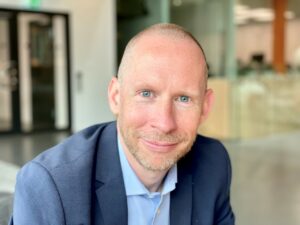Continued growth predicted in Medicon Valley
Medicon Valley, the cluster for life science around Öresund, is growing rapidly. A new survey shows that the Danish side of the cluster currently has 700 life science companies with 58,000 employees. BioStock has spoken to Petter Hartman, CEO of Medicon Village Innovation in Lund. He tells us that the Swedish side is also growing. The CEO predicts continued growth in the sector despite a more uncertain economic situation.
A new report from the Øresund Institute and the Medicon Valley Alliance maps the life science sector in the Danish part of the Øresund region. Over the past five years, 10,500 more people have been employed in the industry on the Danish side of the Øresund. And the report shows that 58,000 people are employed by the approximately 700 companies operating within the life science sector in eastern Denmark.
The Öresund area, also known as Medicon Valley, has long been home to many life science companies, and the sector is growing steadily. The new report shows that around 200 new life science companies have been founded in eastern Denmark since 2017. The majority of the new companies are active in biotechnology and are located in Copenhagen. Growth is predicted to continue in the coming years as new regional investments in facilities and research laboratories worth DKK 32 million are planned.
450 companies in Skåne

There is also considerable activity within life science on the Swedish side of Øresund. The latest survey of life science in Skåne was carried out in 2020, when the Øresund Institute, on behalf of Medicon Valley Alliance, investigated what the life science cluster in Skåne looks like.
“Skåne has about 450 companies operating here and 7,500 people work in the private life science industry. In recent years, it has become increasingly clear that this sector is very important when it comes to job creation and tax revenues,” says Petter Hartman, CEO of Medicon Village Innovation in Lund.
He explains that the Swedish side of the cluster has also seen positive development for several years.
“The last five years we have seen a very positive development in Skåne, something we have noticed clearly here at Medicon Village. Lund has become a research and development hub, with many small innovative companies, while Malmö has become home to production and many of the larger companies. The two cities complement each other very well.”
It has been a couple of eventful years since the survey was conducted, for both the industry and the world in general.
“The pandemic placed a heavy strain on the healthcare system, which in turn meant that clinical studies, for example, had to be paused or postponed. It has been difficult to attend trade shows and investor meetings, but overall, I would say that this industry has done well through the crisis and growth has continued, although at a slightly slower pace. Our industry holds the key to how pandemics and other health-related challenges should be addressed and politicians have really opened their eyes to how the sector can contribute during the crisis.”
The industry is well equipped for uncertain economic conditions
Despite the fact that the pandemic has eased off, 2022 is characterised by turbulence on the stock market and interest rate market, which has meant that many investors are now more cautious. But the development is not too worrying, says Petter Hartman.
“It is mainly the smaller companies that suffer when investors become more uncertain and of course it is tough. Now we are facing a turning point where one can imagine a slowdown after several years of strong growth. But here in Skåne, the innovation system is very strong, where universities, incubators and research parks have created a favourable environment for the companies. We have seen that an environment in which the companies are close to the research, potential partners and financiers provides a greater survival rate, which means that we are quite well equipped for a period of greater economic uncertainty.”
Hartman is convinced that the Öresund cluster will remain attractive, even as risk appetite in the economy decreases.
“As long as the research is strong, as it is here in Lund, there will be attractive ideas that lay the foundation for new viable companies and then the investments will find their way here.”
Wish to see investments in bioentrepreneurship
One obstacle to the industry’s continued growth is skills shortages.
“As companies increase in number and also expand, so does competition for labour. We see a great shortage of people with, for example, regulatory skills, but also with the right business knowledge, it is a bottleneck. If you look at the technical education, it is not uncommon for students to do internships or degree projects at the companies, but that tradition does not exist in the same way in medicine.”
To remedy this, Petter Hartman would have liked to see greater investments in bioentrepreneurship within academia.
“I know there are good initiatives in the pipeline, we need to make sure that researchers and students have the opportunity to cultivate their entrepreneurship to a greater extent.”
Another challenge is internationalisation.
“The pandemic has made international trade more complicated and, above all, it can be difficult for smaller companies to cope with a scale-up to an international level. But now it is important that we get out into the world again and continue where we paused before the pandemic.”

